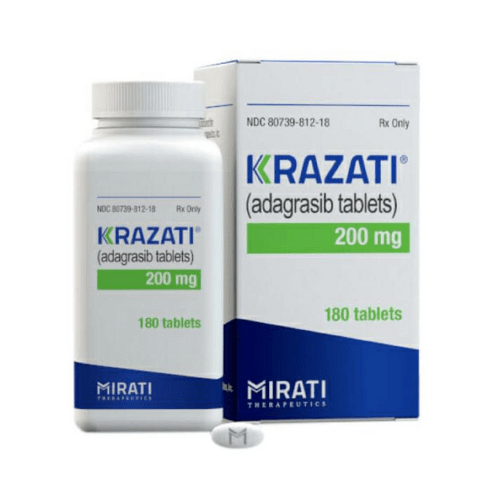
Krazati, developed by Mirati Therapeutics, Inc., was granted accelerated approval by the FDA on December 12, 2022, based on its positive benefit-risk profile and the Phase 2 KRYSTAL-1 study results. Krazati is available in a tablet formulation, with each tablet containing 200mg of adagrasib.
Indication Of Krazati
Krazati (Adagrasib) is an FDA-approved inhibitor of the RAS GTPase family prescribed for treating adult patients with KRAS G12C-mutated locally advanced or metastatic non-small cell lung cancer (NSCLC).
It is indicated for individuals who have undergone at least one prior systemic therapy. This prescription medicine is specifically designed for adults with NSCLC that has spread or is unresectable, carrying an abnormal KRAS G12C gene, and who have undergone at least one prior cancer treatment.
Mechanism of Action
Krazati is an inhibitor of the RAS GTPase family. The RAS proteins are involved in cell signaling pathways that control cell growth and survival. Mutations in the RAS genes, such as the KRAS G12C mutation, can lead to uncontrolled cell growth and are associated with various cancers, including NSCLC. Krazati works by inhibiting the mutated RAS protein, thereby blocking the signaling pathways that promote cancer growth.
Dosage Information
The recommended dosage of Krazati tablet is 600 mg orally twice daily until disease progression or unacceptable toxicity. The tablets should be taken with or without food and swallowed whole with water. If a dose of Krazati is missed, it should be taken as soon as possible, unless it is less than 6 hours until the next dose, in which case the missed dose should be skipped.
Drug Interactions
It is crucial to avoid simultaneous use with strong CYP3A4 inducers, strong CYP3A4 inhibitors until Krazati concentrations stabilize, sensitive CYP3A4 substrates, sensitive CYP2C9 or CYP2D6 substrates, or P-gp substrates where minimal concentration changes could lead to severe adverse reactions. Additionally, refrain from combining Krazati with drugs that prolong the QT interval. Always adhere to prescribed guidelines and consult with healthcare professionals for optimal safety and efficacy.
Krazati may interact with drugs that affect the QTc interval, a measure of the time between the start of the Q wave and the end of the T wave in the heart’s electrical cycle. It is important to inform the healthcare provider of all medications, supplements, and herbal products being taken before starting Krazati to avoid potential drug interactions.
Warning And Precaution
Gastrointestinal Adverse Reactions: Regularly monitor patients for symptoms of gastrointestinal issues, including diarrhea, nausea, and vomiting. Provide appropriate supportive care when necessary, and assess the severity to determine potential actions such as withholding, dose reduction, or permanent discontinuation. If you experience any of these symptoms, inform your doctor immediately.
Hepatotoxicity: Conduct liver laboratory tests before initiating Krazati and monthly for three months thereafter, or as clinically indicated. Adjust the dosage, consider withholding, or implement permanent discontinuation based on the severity of the condition. Promptly inform your doctor if you notice any signs of liver-related issues.
QTc Interval Prolongation: Avoid concurrent use with products known for prolonging the QTc interval. Monitor electrocardiograms (ECG) and electrolyte levels, especially if you are at risk or taking QT-prolonging medications. Adjust the dosage of Krazati based on the severity of the condition, or contemplate withholding or permanently discontinuing as needed.
Interstitial Lung Disease/Pneumonitis: Be vigilant for new or worsening respiratory symptoms. If suspicion arises, temporarily suspend Krazati administration and consider permanent discontinuation if no alternative causes for interstitial lung disease (ILD)/pneumonitis are identified. If you experience any respiratory issues, promptly inform your doctor.
Usage in Specific Populations
Pregnancy: Krazati carries the potential for fetal harm and necessitates informing pregnant individuals about the associated risks to the fetus. Effective contraception is crucial during Krazati treatment and for at least 1 week after the final dose.
Lactation: Breastfeeding is not recommended during Krazati treatment and for at least 1 week post the last dose due to the potential for serious adverse reactions in breastfed infants.
Pediatric Use: The safety and effectiveness of Krazati in pediatric patients have not been determined.
Geriatric Use: Age-based dosage adjustments are not recommended; however, geriatric patients may exhibit increased sensitivity to Krazati effects due to factors like reduced kidney function. Close monitoring is advisable.
Side Effects
Common side effects of Krazati include:
- Nausea
- Diarrhea
- Vomiting
- Fatigue
- Musculoskeletal pain
- Hepatotoxicity
- Renal impairment
- Edema
- Dyspnea
- Decreased appetite
Permanent discontinuation due to adverse reactions occurred in 13% of patients, and laboratory abnormalities, such as decreased lymphocytes, increased aspartate aminotransferase, decreased sodium, and decreased hemoglobin, were also reported.
How can I buy Krazati online?
Purchasing Krazati online is a straightforward process, particularly for individuals in the US and Europe. To start this procedure, you can contact SANSFRO Health or other reputable companies specializing in importing drugs from these regions.
For detailed and India-specific information about Krazati, reach out to our dedicated Patient Support Team at (91) 9315705373 or via email at help@sansfro.com. As a trusted health company, SANSFRO Health is committed to providing accurate and up-to-date information of Krazati cost in the Indian market. Ensure a smooth and reliable process for obtaining this essential medication by utilizing our services.
In conclusion, Krazati (Adagrasib) is an FDA-approved drug for the treatment of adult patients with KRAS G12C-mutated locally advanced or metastatic NSCLC. It has shown promising results in clinical trials, but it is associated with a range of potential side effects and requires careful monitoring, especially in specific populations such as pregnant women, breastfeeding mothers, and geriatric patients. Patients should always consult their healthcare provider for personalized medical advice and to discuss the potential benefits and risks of treatment with Krazati. For more information contact your healthcare professional.
FAQs
What medical conditions should I disclose to my healthcare provider before starting Krazati?
Inform your healthcare provider about all your medical conditions, especially if you have any heart problems, including heart failure and congenital long QT syndrome, or if you have liver problems.
How should I take Krazati?
Take Krazati at the same time every day with or without food. Swallow the tablets whole; do not chew, crush, or split them. If vomiting occurs after taking Krazati, do not take an additional dose. Resume dosing at the next scheduled time.
What should I do if I miss a dose of Krazati?
If you accidentally miss taking a dose of Krazati and more than 4 hours have passed since the scheduled time, it’s best to skip it. Simply resume your regular dosing schedule with the next scheduled dose. Follow the instructions provided by your healthcare provider and the medication guidelines for your specific situation.
Reference:
- https://www.fda.gov/drugs/resources-information-approved-drugs/fda-grants-accelerated-approval-adagrasib-kras-g12c-mutated-nsclc
- https://www.drugs.com/Krazati.html#uses
- https://www.accessdata.fda.gov/drugsatfda_docs/nda/2023/216340Orig1s000Approv.pdf
- https://www.accessdata.fda.gov/drugsatfda_docs/label/2022/216340s000lbl.pdf



